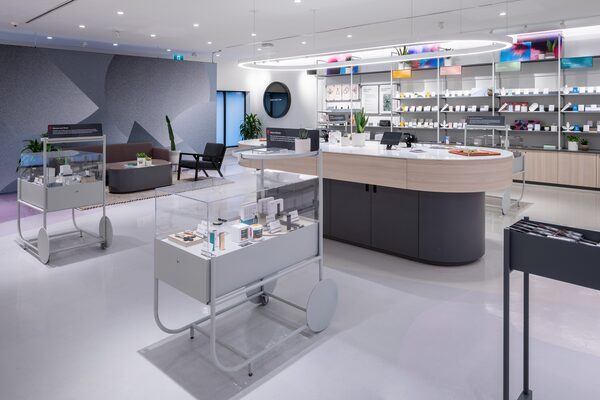
A Tokyo Smoke café on Queen Street West in Toronto.handout
I am sitting in a hemp-free zone. This Tokyo Smoke café in downtown Toronto has no marijuana-leaf flags, nothing in red, yellow or green, no sign of Bob Marley and nothing that looks at all like a bong.
However, “cannabis accessories” are for sale. Indeed, this space on Queen Street West, and the brand it represents, are all about consumption of that particular substance.
“We didn’t want this [place] to feel like it came from the back of a strip mall,” says Berkeley Poole, who oversees design for Hiku, the parent company of Tokyo Smoke, and is reclining next to me on a custom oak-and-leather sofa. “We’re mindful of the fact that people are design-savvy. And they want to purchase products, as with any other aspect of their life, that they wouldn’t be ashamed [of].”
So here we are, before a mural by painter Kathryn Macnaughton. The sleek black tray Poole is holding, designed by the firm Castor for Tokyo Smoke, is meant for rolling your weed – or, rather, your “cannabis.” The precious substance is known here by that noun only. And Tokyo Smoke cannot actually sell it to you, at least not in Ontario, at least not yet. So the brand is working to build its tribe of future customers and sell them some accessories in the interim. It’s a complicated marketing dance, and design – a very particular flavour of design – is crucially important.

The café's design features a special blend of Scandinavian modern, industrial toughness and high art.handout

Ms. Poole sums up Tokyo Smoke's approach as upscale and 'design-forward.'handout
The café’s accessories, and its interior by Design Agency, capture an aesthetic that Tokyo Smoke has been pursuing for a few years, and which Ms. Poole is now overseeing at the brand and its sister company Van der Pop, the female-focused cannabis brand.
The growth of legalized cannabis has created all sorts of opportunities – including, in this case, to redefine the drug as a part of a sophisticated lifestyle. Ms. Poole sums up the approach as upscale and “design-forward.”
“Design,” in this context, is a special blend of Scandinavian modern, industrial toughness and high art. The space opened last year, and Design Agency partner Anwar Mekhayech explains that a certain mystery was part of the recipe. “We thought people should come and slowly discover that it was a cannabis café,” he says.
The café serves coffee from a bar fronted with concrete tiles that bear the brand’s oval logo. One wall is tiled in cork with a pale wash, and the tables are made from a mix of hot-rolled steel, solid wood and two types of marble.
The materials and details send mixed signals. The interior design feels like a hipsterish café, but also slightly like a bar, a fast-fashion clothing store and a beauty-products shop. “It’s a little bit art gallery, it’s a little bit industrial-chic, there’s a vintage element to it as well,” Mr. Mekhayech says.

The café serves coffee from a bar fronted with concrete tiles that bear the brand’s oval logo.handout
All this creativity is being directed into a market whose size, and place in society, is still not clear. Tokyo Smoke now operates dispensaries in Manitoba, and is hoping to get a coveted licence to do so in Ontario. The Manitoba stores, designed by the firm Jackman Reinvents along with Tokyo Smoke designers under Ms. Poole’s direction, feel somewhat different from the café. When I ask Ms. Poole to compare the dispensaries to existing retail categories, she says she thinks about cannabis as “a hybrid of liquor and beauty, but also its own thing.”
Ms. Poole, a 31-year-old Toronto native, most recently worked as a creative director at Barney’s New York; she also co-founded Adult, a “magazine of new erotics,” with former Globe and Mail columnist Sarah Nicole Prickett.
With her move to Hiku, she took over the Tokyo Smoke brand, which had already been evolving its particular ethos over a number of years. Its youthful head, Alan Gertner, is a former Google Canada executive; his father and partner, Lorne Gertner, is an entrepreneur and banker who has invested widely in medical marijana and in recreational cannabis. The elder Mr. Gertner has been a pioneer in the business during an era “when things were still very uncertain,” Design Agency’s Mr. Mekhayech says.

A Tokyo Smoke dispensary in Winnipeg.LINDSAY REID/handout

Tokyo Smoke is hoping to get a coveted licence to operate cannabis dispensaries in Ontario.LINDSAY REID/handout
Accordingly, the beginnings of Tokyo Smoke, as a café and accessory shop, were less about selling specific products than about identifying and bringing together a specific slice of the population. “Like-minded people who share the interest at this high level can congregate here,” Mr. Mekhayech says. “There’s a sense of mystery and discovery that, over the past few years and the buildup to legalization, was very relevant.”
Since the cafés themselves don’t sell cannabis, a very subtle visual language is at work here. Ms. Poole talks about “the culture” of cannabis.
In the postlegalization landscape, things look a bit different – Hiku, along with other players in the industry, is hoping to carve out a unique position in the field as cannabis retail grows. The biggest brand to date, Canopy Growth’s Tweed, has a slightly more anodyne approach to its branding and interiors: Its dispensaries feature lots of barn board and vaguely collegiate vignettes of bookcases and blankets. It’s the Roots of pot.

The Manitoba stores are designed by the firm Jackman Reinvents, along with Tokyo Smoke designers under Ms. Poole’s direction.LINDSAY REID/handout
Tokyo Smoke, by contrast, has collaborated with the mischievous Castor on a line of accessories including the Lantern rolling tray, which Ms. Poole showed me. It was inspired, she says, by Isamu Noguchi’s playscapes. That sits on a shelf alongside products by Van der Pop, which Tokyo Smoke acquired a few years ago. The goal is to be “approachable and welcoming,” Ms. Poole says.
Welcoming, especially, to people with a certain sensibility. “I can imagine a couple bringing this home,” Ms. Poole says, gesturing to the Lantern tray, “to sit on their Noguchi coffee table.” If you can imagine yourself within that anecdote, then this may be the place for you to find the stuff you’re looking for.
 Alex Bozikovic
Alex Bozikovic